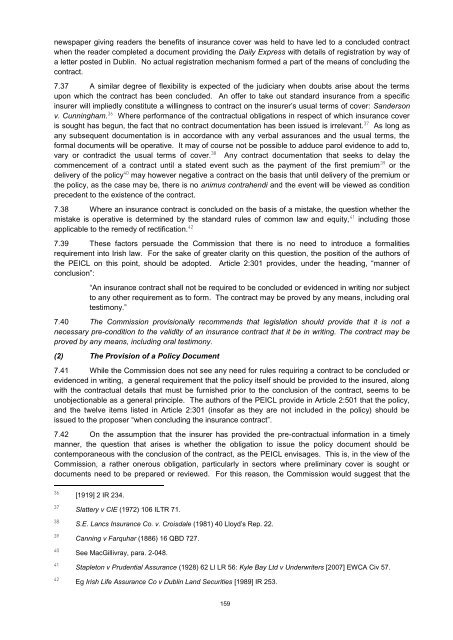Insurance Contracts CP - Law Reform Commission
Insurance Contracts CP - Law Reform Commission
Insurance Contracts CP - Law Reform Commission
You also want an ePaper? Increase the reach of your titles
YUMPU automatically turns print PDFs into web optimized ePapers that Google loves.
newspaper giving readers the benefits of insurance cover was held to have led to a concluded contract<br />
when the reader completed a document providing the Daily Express with details of registration by way of<br />
a letter posted in Dublin. No actual registration mechanism formed a part of the means of concluding the<br />
contract.<br />
7.37 A similar degree of flexibility is expected of the judiciary when doubts arise about the terms<br />
upon which the contract has been concluded. An offer to take out standard insurance from a specific<br />
insurer will impliedly constitute a willingness to contract on the insurer‘s usual terms of cover: Sanderson<br />
v. Cunningham. 36 Where performance of the contractual obligations in respect of which insurance cover<br />
is sought has begun, the fact that no contract documentation has been issued is irrelevant. 37 As long as<br />
any subsequent documentation is in accordance with any verbal assurances and the usual terms, the<br />
formal documents will be operative. It may of course not be possible to adduce parol evidence to add to,<br />
vary or contradict the usual terms of cover. 38 Any contract documentation that seeks to delay the<br />
commencement of a contract until a stated event such as the payment of the first premium 39 or the<br />
delivery of the policy 40 may however negative a contract on the basis that until delivery of the premium or<br />
the policy, as the case may be, there is no animus contrahendi and the event will be viewed as condition<br />
precedent to the existence of the contract.<br />
7.38 Where an insurance contract is concluded on the basis of a mistake, the question whether the<br />
mistake is operative is determined by the standard rules of common law and equity, 41 including those<br />
applicable to the remedy of rectification. 42<br />
7.39 These factors persuade the <strong>Commission</strong> that there is no need to introduce a formalities<br />
requirement into Irish law. For the sake of greater clarity on this question, the position of the authors of<br />
the PEICL on this point, should be adopted. Article 2:301 provides, under the heading, ―manner of<br />
conclusion‖:<br />
―An insurance contract shall not be required to be concluded or evidenced in writing nor subject<br />
to any other requirement as to form. The contract may be proved by any means, including oral<br />
testimony.‖<br />
7.40 The <strong>Commission</strong> provisionally recommends that legislation should provide that it is not a<br />
necessary pre-condition to the validity of an insurance contract that it be in writing. The contract may be<br />
proved by any means, including oral testimony.<br />
(2) The Provision of a Policy Document<br />
7.41 While the <strong>Commission</strong> does not see any need for rules requiring a contract to be concluded or<br />
evidenced in writing, a general requirement that the policy itself should be provided to the insured, along<br />
with the contractual details that must be furnished prior to the conclusion of the contract, seems to be<br />
unobjectionable as a general principle. The authors of the PEICL provide in Article 2:501 that the policy,<br />
and the twelve items listed in Article 2:301 (insofar as they are not included in the policy) should be<br />
issued to the proposer ―when concluding the insurance contract‖.<br />
7.42 On the assumption that the insurer has provided the pre-contractual information in a timely<br />
manner, the question that arises is whether the obligation to issue the policy document should be<br />
contemporaneous with the conclusion of the contract, as the PEICL envisages. This is, in the view of the<br />
<strong>Commission</strong>, a rather onerous obligation, particularly in sectors where preliminary cover is sought or<br />
documents need to be prepared or reviewed. For this reason, the <strong>Commission</strong> would suggest that the<br />
36<br />
37<br />
38<br />
39<br />
40<br />
41<br />
42<br />
[1919] 2 IR 234.<br />
Slattery v CIE (1972) 106 ILTR 71.<br />
S.E. Lancs <strong>Insurance</strong> Co. v. Croisdale (1981) 40 Lloyd‘s Rep. 22.<br />
Canning v Farquhar (1886) 16 QBD 727.<br />
See MacGillivray, para. 2-048.<br />
Stapleton v Prudential Assurance (1928) 62 Ll LR 56: Kyle Bay Ltd v Underwriters [2007] EWCA Civ 57.<br />
Eg Irish Life Assurance Co v Dublin Land Securities [1989] IR 253.<br />
159

















